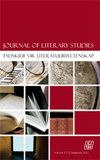焦虑竞赛:探索马拉维COVID-19大流行的诗意想象
IF 0.1
4区 文学
0 LITERARY THEORY & CRITICISM
引用次数: 1
摘要
当我在2021年9月中旬撰写这篇文章时,严重急性呼吸系统综合征冠状病毒(SARS-CoV-2)大流行已夺去了全球近470万人的生命,超过2.28亿人受到感染。本文探讨了冠状病毒的诗意想象,重点关注马拉维诗人如何在诗歌中想象疫情对人类造成的破坏。具体来说,它考虑了马丁·朱瓦、威廉·姆皮纳和比顿·加拉法编辑的《行走战场:关于COVID-19大流行的马拉维诗歌选集》中的诗歌如何探索COVID-19带来的混乱、震惊和困惑。我还认为,阅读这些诗可以开启一场关于人类精神在面临威胁生命的传染病时的希望和不屈不挠的韧性的话语辩论。预计2021年9月中旬,全球将出现SARS-CoV-2大流行,死亡人数为470万人次geëis或2.28亿人次wêreldwyd geïnfekteer。研究人员将其命名为verken die poëtiese verbeeldingswêreld van die koronavirus,重点关注的是在马拉维发生的埃博拉病毒,在马拉维发生的埃博拉病毒,在马拉维发生的埃博拉病毒,在马拉维发生的埃博拉病毒,在马拉维发生的埃博拉病毒,在马拉维发生的埃博拉病毒。《走在战场上:关于COVID-19大流行的马拉维诗歌选集》是一本由马丁·朱瓦、威廉·姆皮纳和比顿·加拉法合著的书,书中描述了一种混乱,一种混乱,一种混乱,一种混乱,一种混乱,一种混乱,一种混乱,一种混乱,一种混乱。这句话的意思是:“我喜欢你,我喜欢你,我喜欢你,我喜欢你,我喜欢你,我喜欢你。”本文章由计算机程序翻译,如有差异,请以英文原文为准。
Anxious Competition: Exploring the Poetic Imaginarium of the COVID-19 Pandemic in Malawi
As I write this article in mid-September 2021, the severe acute respiratory syndrome coronavirus (SARS-CoV-2) pandemic has claimed the lives of nearly 4.7 million people and over 228 million others have been infected worldwide. This article explores the poetic imaginarium of the coronavirus, focusing on how selected Malawian poets imagine the devastation wrought on human beings by the pandemic in their poetry. Specifically, it considers how selected poems in Walking the Battlefield: An Anthology of Malawian Poetry on the COVID-19 Pandemic—a book edited by Martin Juwa, William Mpina and Beaton Galafa—explore the chaos, shock and bewilderment brought on by COVID-19. I also argue that a reading of the poems allows for an opening up of a discursive debate on the hope and indomitable resilience of the human spirit when confronted by life-threatening contagions.
Opsomming
Terwyl ek hierdie referaat in mid-September 2021 skryf, het die ernstige akute respiratoriese sindroom koronavirus (SARS-CoV-2)-pandemie reeds die lewens van bykans 4.7 miljoen mense geëis en meer as 228 miljoen is wêreldwyd geïnfekteer. Hierdie referaat verken die poëtiese verbeeldingswêreld van die koronavirus, en fokus op gekose Malawiese digters wat in hul poësie die vernietiging wat die pandemie in mense se lewens veroorsaak, in hul verbeelding ervaar. Dit besin spesifiek oor hoe gekose gedigte in Walking the Battlefield: An Anthology of Malawian Poetry on the COVID-19 Pandemic—’n boek wat deur Martin Juwa, William Mpina en Beaton Galafa geredigeer is—die chaos, skok en verbystering verken wat deur COVID-19 teweeggebring is. Ek voer ook aan dat ’n voorlesing van die gedigte ’n beredeneerde debat moontlik maak oor die hoop en onblusbare veerkragtigheid van die menslike gees wanneer dit deur lewensbedreigende aansteeklike siektes gekonfronteer word.
求助全文
通过发布文献求助,成功后即可免费获取论文全文。
去求助
来源期刊

Journal of Literary Studies
Multiple-
CiteScore
0.50
自引率
0.00%
发文量
0
期刊介绍:
The Journal of Literary Studies publishes and globally disseminates original and cutting-edge research informed by Literary and Cultural Theory. The Journal is an independent quarterly publication owned and published by the South African Literary Society in partnership with Unisa Press and Taylor & Francis. It is housed and produced in the division Theory of Literature at the University of South Africa and is accredited and subsidised by the South African Department of Higher Education and Training. The aim of the journal is to publish articles and full-length review essays informed by Literary Theory in the General Literary Theory subject area and mostly covering Formalism, New Criticism, Semiotics, Structuralism, Marxism, Poststructuralism, Psychoanalysis, Gender studies, New Historicism, Ecocriticism, Animal Studies, Reception Theory, Comparative Literature, Narrative Theory, Drama Theory, Poetry Theory, and Biography and Autobiography.
 求助内容:
求助内容: 应助结果提醒方式:
应助结果提醒方式:


